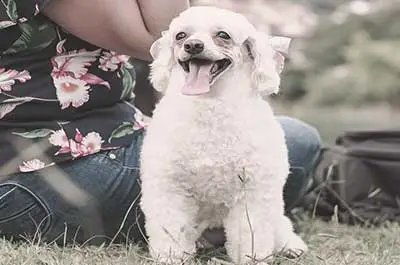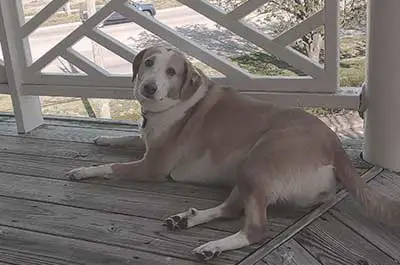If you’re like most people, you consider your pet to be part of the family. And just like with any other family member, you want them to be healthy and happy.
So if you’ve noticed that your pet is slightly overweight, you may wonder how you can help them lose weight.
Thankfully, you can do a few things to help get your pet on the road to a healthier weight. Keep reading for tips on how to help your pet shed excess weight!
Talk to your veterinarian about your pet’s weight and overall health.
Many pet owners are surprised to learn that their furry friend is overweight. Like humans, being overweight or obese can put pets at risk for several health problems, including diabetes, joint pain, and respiratory issues 1.
Like most pet owners, you want what’s best for your furry friend. That includes maintaining a healthy weight. But how can you tell if your pet is at a healthy weight, and what can you do to help them lose weight if they’re not? The first step is to talk to your veterinarian.

They can assess your pet’s health and offer guidance on how to help them reach and maintain the ideal weight. They can help you create a tailored plan for your pet based on their age, activity level, and health.
They may also recommend changes to your pet’s diet or exercise routine. So don’t hesitate to ask your vet about your pet’s weight and overall health. They’ll be glad to help you ensure that your beloved companion stays healthy and happy for years to come.
Invest in a puzzle feeder toy.
If your pet is overweight, one of the best things you can do is help them burn off some of those extra calories. And what better way to do that than with a puzzle feeder toy?
A puzzle feeder is designed to challenge your pet and help them burn calories as they play. They’re a great way to keep your pet active and engaged, and they can help them lose weight safely and effectively.
So if you’re looking for a way to help your pet slim down, a puzzle feeder toy is a great option.
There are plenty of different puzzle feeders on the market, so take some time to find one that’s right for your pet. And make sure to supervise your pet while they’re playing with their new toy, just to be safe.
Make sure your pet is getting enough exercise.
We all know that exercise is vital for our health, but did you know it’s just as important for our pets? Keeping your pet active not only helps to maintain their muscle tone and joint flexibility but can also help them lose weight.
Obesity is a serious problem in pets and can lead to various other health problems, including diabetes, arthritis, and even heart disease 2.
So how can you ensure that your pet is getting enough exercise? One way is to take them for regular walks or, even better, runs! Daily exercise is essential for maintaining a healthy weight, so keep your pet moving.
If you have a dog, this is likely something you already do, but if you have a cat or another type of pet, you might need to get creative.
Try playing fetch with your cat or setting up an obstacle course for your hamster. Whatever you do, ensure your pet gets the exercise they need to stay healthy and happy.
Not only will they love the attention, but they’ll also start to feel better and have more energy. And who knows, you might even lose a few pounds yourself in the process!
Make sure you feed your pet the right amount of food and a healthy diet.
Your pet’s diet is an important part of helping them lose weight, so be sure to talk to your veterinary physician about what kind of food is best for them.
Once you have a plan, stick to it and help your pet achieve its goals. That means being consistent with meal times and portion sizes.
Like humans, pets can gain weight if they overeat or consume unhealthy foods. So it’s vital to ensure you’re feeding your pet the right amount of healthy food.
Focus on high-quality, nutritious foods. Avoid processed foods and those high in sugar. Instead, opt for meat, fats, bones, and vegetables.
By following these tips, you can help your pet lose weight safely and effectively. Just remember to be patient and consistent.
Avoid feeding them table scraps or giving them too many treats.
Treating your pet is a great way to show them how much you love them, but it’s essential to be mindful of how many treats you give them.
Like people, pets can gain weight if they consume too many calories from treats. So if you’re trying to help your pet lose weight, limit the number of treats you give them, especially if they are high in fat or sugar.
Instead, opt for healthy alternatives like training treats or small pieces of fruit and vegetables. You can also use their favorite toys as rewards for good behavior.
Here are some rewards you can give your pet instead of treats:
- A toy
- A game of fetch
- Petting or scratching
- Extra attention
Whatever you do, just make sure you’re mindful of how many calories your pet consumes daily. Treats should be given in moderation and should not make up a large part of their
Table scraps are another no-no when it comes to pet weight loss. Pets should never eat table scraps because they are typically high in calories and fat.
They can also lead to begging behavior, which can be annoying for you and your guests. So save the table scraps for yourself and give your pet a healthy diet to help them slim down.
By following these tips, you can help your pet lose weight while still showing them how much you care.
Monitor your pet’s weight and progress.
When you’re trying to help your pet lose weight, it’s necessary to monitor their progress so you can adjust your plan as needed. Weigh your pet regularly and keep track of their weight loss (or lack thereof).
This will help you gauge how well your plan is working and whether or not you need to make any changes.
Additionally, take note of how your pet is feeling. Are they more energetic? Are they having any trouble with mobility? These are all important factors to consider when determining whether or not your pet is on track.
If you’re concerned about your pet’s weight loss progress or if they seem to be having difficulties, be sure to talk to your veterinarian. They can help you adjust your plan and ensure your pet is healthy and happy.
Adjust your pet’s diet by feeding them smaller portions.
If your pet isn’t losing weight as quickly as you’d like, one of the first things you can do is adjust their diet.
Start by feeding them smaller portions at each meal. This will help reduce their calorie intake and promote weight loss.
They may be hungry initially, but they’ll eventually adjust to the smaller portions. Just be sure not to overdo it, or you could stunt their growth.
You can also try changing up their food. If they are currently eating dry food, try switching to wet food. Or, if they usually eat kibble, try giving them canned food instead. Sometimes a change in diet is all it takes to jumpstart weight loss.
Give them plenty of fresh water.
In addition to adjusting their food, you can help your pet lose weight by ensuring they stay hydrated.

Give them plenty of fresh water to drink throughout the day, and include some wet food in their diet if possible. This will help them feel full and prevent overeating.
Additionally, water helps flush toxins from the body and boost metabolism. So make sure your pet always has access to fresh water and encourage them to drink it up.
On the funny side, the vet told me that often when an animal is overweight or obese, its body will actually hold on to water because it’s trying to protect itself.
So by increasing water intake, you’re helping your pet’s body to let go of the excess water it’s been holding on to.
Keep an eye out for medical issues that lead to weight gain in pets.
There are a variety of medical conditions that can cause pets to gain weight. If your pet is overweight, it’s crucial to rule out any potential underlying health issues.
Some common problems that can contribute to pet weight gain include:
- Hypothyroidism
- Cushing’s disease
- Diabetes
- Kidney disease
Talk to your veterinarian if you suspect your pet may have one of these conditions. They can run tests to determine if there is a medical problem and help you develop a treatment plan.
Most pets can lose weight safely and effectively with proper diet and exercise. However, some medical conditions can make weight loss more difficult.
Talk to your veterinarian if you are concerned about your pet’s weight.
Be patient and consistent.
Losing weight takes time, so it’s essential to be patient when you’re helping your pet slim down. Don’t get discouraged if they don’t lose a lot of weight right away.

Just keep at it, and eventually, they’ll reach their goal. And, as always, be sure to talk to your veterinary physician if you have any concerns. They can help you troubleshoot any problems and ensure your pet is healthy and happy.
Consistency is the most important thing to remember when helping your pet lose weight. Don’t give up if they have a bad week or two. Just keep at it, and eventually, they’ll reach their goal weight.
Finally, don’t forget to show your pet plenty of love and attention during their weight loss journey.
They may be feeling a little down about dieting and exercising, so it’s important to make them feel loved and supported. Give them lots of treats (in moderation), cuddles, and belly rubs to let them know you’re there for them.
Conclusion.
Losing weight is a gradual process, but it’s definitely possible with some effort and consistency.
By following the tips above, you can help your pet lose weight safely and effectively. Be sure to talk to your veterinarian first to ensure there are no underlying health issues and to develop a proper plan for your pet.
With some time and effort, you’ll be on your way to a healthier, happier pet. Thanks for reading!

Meet Brenda Tillman: your go-to expert in Cognitive Behavioral Therapy! Not only is she a seasoned therapist, but she’s also a passionate mom blogger who never misses a beat. Dive deep into her insightful blogs, backed by her extensive coursework in Parenting Skills, Learning, and Education. Brenda’s heartwarming family – a son, two daughters, and their adorable pets – often take center stage in her writings. From parenting hacks and relationship tips to health & fitness nuggets, Brenda has been enlightening her readers for over half a decade. Stick around, and you’re bound to discover gems from a mom who wears many hats with grace!
Reviewed By: Joanna Perez and Marcella Raskin
Edited By: Lenny Terra
Fact Checked By: Gabrielle J. Smith
Photos Taken or Curated By: Matthew Mansour

